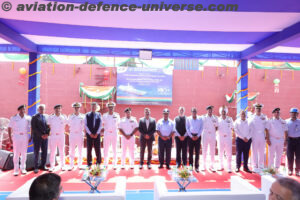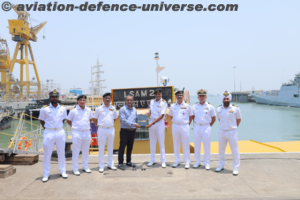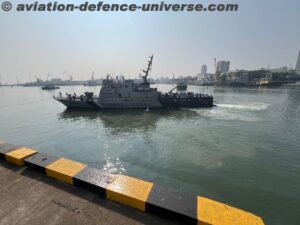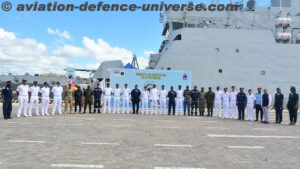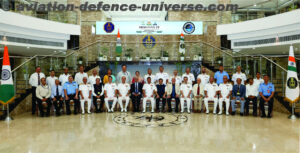New Delhi. 31 May 2019. Admiral Sunil Lanba, PVSM, AVSM, ADC, Chief of the Naval Staff will relinquish command of the Indian Navy as the 23rd CNS on completion of his tenure and retirement from service today on 31 May 2019, after over four decades of distinguished service.
An alumnus of the National Defence Academy, Khadakwasla, Defence Services Staff College, Wellington, College of Defence Management, Secunderabad and Royal College of Defence Studies, London, the Admiral’s career has been enriched with vast experience at sea as well as in operational, training and tri-services appointments. Prior to being elevated to the Flag rank, Admiral Lanba was deeply engaged with professional training, shaping future leadership and skilling of the officers of the Indian Armed Forces.
On elevation to the Flag rank, Admiral Lanba held several significant assignments in the Navy including Chief of Staff, Southern Naval Command, Flag Officer Sea Training and Flag Officer Commanding Maharashtra and Gujarat Naval Area. On promotion to the rank of Vice Admiral, he was the Chief of Staff, Eastern Naval Command, Commandant, National Defence College and the Vice Chief of the Naval Staff. Prior to taking over as Chief of the Naval Staff on 31 May 2016, Admiral Lanba was the Flag Officer Commanding-in-Chief of the Southern and Western Naval Commands. He took over as the Chairman, Chiefs of Staff Committee on 01 January 2017.
HL2Z.jpeg)
During his tenure as the CNS, Admiral Lanba set the tone for several transitions in operational, training and organisational philosophy of the Indian Navy. The Mission Based Deployments introduced in June 2017 transformed the operational philosophy to deploying mission-ready ships and aircraft along critical sea lanes of communications and choke points. These deployed ships are always ready to meet any eventuality across the spectrum of operations ranging from acts of maritime terrorism and piracy to HADR. The Mission Based Deployments enabled Indian Naval units to be the first responder in crisis situations and showcased Indian Navy as the main instrument in India becoming a Net Security Provider in the Indian Ocean Region.
Admiral Lanba has also steered implementation of the new transition cycle which facilitated improvement of the overall readiness of ships and submarines in undertaking operational tasking and Mission Based Deployments. This transition saw considerable improvement in combat efficiency and crew proficiency of ships, resulting in overall improvement of Op Logistics, spares management and forecasting refit planning and expenditure management.
The Admiral’s tenure saw Indian Navy’s Foreign Cooperation initiatives becoming a ‘key driver’ to propel ‘India’s Defence Diplomacy’ to greater heights in the Indo-Pacific. Accordingly, as part of IN’s Capacity Building initiatives, the IN facilitated provision of a record number of naval assets to various IOR littorals and has also established itself as the preferred destination for niche training in the field of submarine, aviation and asymmetric warfare.
The IN also initiated forums for meaningful interactions at various levels; this includes the Sea-Rider programme for Junior Officers, Exercise SAMBANDH and Regional Maritime Security Course for mid-level Officers, and Goa Maritime Conclave for Chiefs of Navy, all of which have elevated our Foreign Cooperation engagements with our Friendly Foreign Countries.
His tenure has seen the reinvigoration of our multilateral engagements, in that we celebrated the 10th Anniversary of the IONS construct, took over as co-Chair for the IONS Working Group on Information Sharing and Interoperability, ratified the ‘IONS Guidelines for HADR’, conducted the first MILAN Exercise at Sea off Port Blair in Mar 2018 and also concluded several Operational and Logistics agreements with Friendly Foreign Countries.
Under his command, the Indian Navy examined and put into place a series of measures under the ‘Make in India’ initiative of the Government and also recommended ways to further indigenize defence procurements in order to overcome major challenges being faced therein. 49 ships and submarines are currently under construction in Indian shipyards, including the first indigenous aircraft carrier ‘Vikrant’. The ‘Indian Naval Indigenisation Plan 2015-30’ lays down the Navy’s plans for the next fifteen years which allows for Industry to formulate strategies to meet the requirements of the Navy through the new Strategic Partnership Model, notified in May 2017, as well as domestic R&D. These initiatives are aimed at enhancing indigenous defence industrial capability extending up to the Micro Small and Medium Enterprises.
In consonance with the Government’s digital vision, the Admiral’s tenure saw the launch of a new Digital Library available pan-Navy for knowledge management and retrieval including archiving of critical data and information. This was complemented by security and hardening of naval data networks in keeping with contemporary cyber security practices. In keeping with the Navy’s ethos of harnessing niche technologies, concrete plans to incorporate Big Data Analytics and Artificial Intelligence into the Navy’s operational functioning have also been formulated.
The Admiral’s tenure also saw the Navy undertake ‘Functional Re-Organisation of Indian Navy towards improving Operational Efficiency’ and ‘Optimal Manning’. Towards this a strategy aimed at enhancing administrative efficiency in the Navy and achieving Optimal Administrative support, as the desired end state was promulgated in April 2019. Under this, the need for greater empowerment of Base Depot Ships has been envisaged which would greatly improve upon the Vital, Essential and Desirable elements of Administration in the Navy. These Administrative reforms and transformation intend to bring visible improvement in the quality of life and enhance satisfaction levels of personnel which would act an enabler for developing motivated and committed teams. This is a reinforcement of the tenet that ‘human resource measures and sound administration’ have been, and will always be, amongst the key enablers of Operational Effectiveness.
Mrs Reena Lanba has been at the helm of the Navy Wives Welfare Association since 31 May 2016. Her untiring efforts towards women empowerment and welfare were evident with the successful collaboration of NWWA with reputed institutes like Tata Institute of Social Sciences and INLINGUA. Under her able guidance ‘PrepMantra App’, an online platform for study material and exam preparation, was launched for all naval personnel and their dependents. With the aim to increase awareness amongst NWWA members on child care and importance of becoming self-reliant ‘Swayam Siddha’ lecture series and contest were conducted pan Navy. Women health being the prime objective, Mrs Reena Lanba introduced ‘Well Women Clinic’ for annual medical checkup for NWWA members. Keeping the essence of NWWA, members were provided an opportunity to specialise in different products such as natural fabrics while working in Udyogika and Tarsh units. In collaboration with Naval Education Society, many initiatives were taken to improve quality of education for students of Navy Children Schools at all stations across India. In shaping a new vision for NWWA she was the inspiration behind designing the NWWA Logo depicting the ethos of the organisation, creation of the NWWA song, initiation of the YOLO (you only live once) event to provide a forum for young and old to informally celebrate naval social fabric, connecting the pan Indian NWWA organisation through social media – Telegram, publication of a NWWA coffee table book, policy formulation initiatives for streamlining the organisation, starting orientation capsules for newly wed NWWA members, emphasis on yoga and meditation and many more such initiatives that have propelled the organisation to greater heights and contributed silently to a happy navy family. As a befitting tribute to her able leadership and tutelage, NWWA was awarded the prestigious 4th Women Astitva Samman.
ADU wishes both the Chief & the First Lady a happy retired life.






































